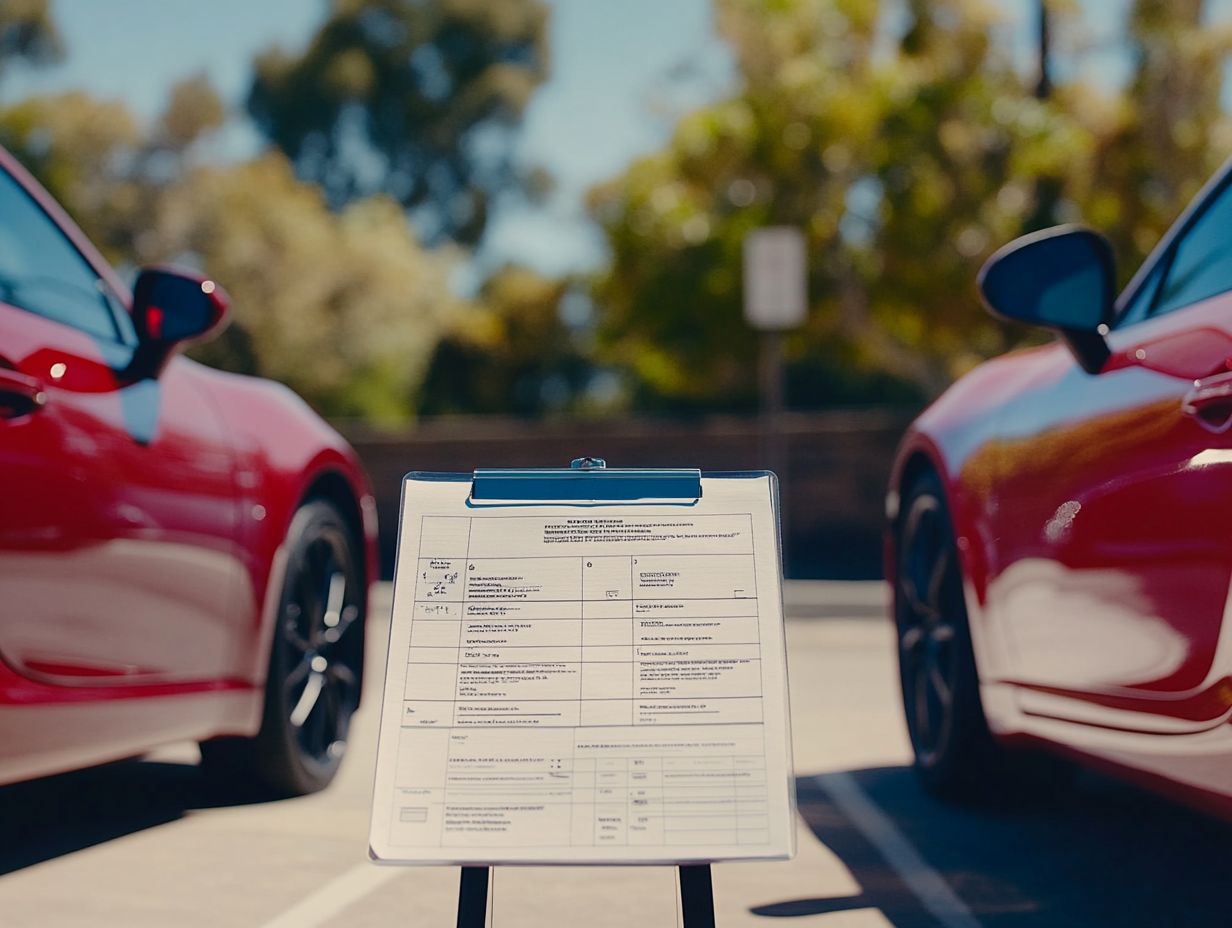10 Common Mistakes in Car Comparisons
When it comes to purchasing a car, making an informed decision is essential.
However, many buyers stumble into familiar traps that can lead to regret later on. From neglecting personal needs to obsessively chasing the lowest price, these missteps can profoundly affect your purchase.
This article reveals the top ten mistakes people often make when comparing cars and provides valuable insights on how to steer clear of them. With these tips on making intelligent comparisons, you can confidently drive away knowing you ve made the right choice.
Contents
- Key Takeaways:
- 1. Not Considering Your Needs and Priorities
- 2. Focusing Only on Price
- 3. Not Researching the Vehicle’s Reliability and Maintenance Costs
- 4. Ignoring Safety Features and Ratings
- 5. Not Test Driving the Vehicle
- 6. Overlooking Fuel Efficiency
- 7. Not Considering Resale Value
- 8. Not Factoring in Insurance Costs
- 9. Not Considering the Vehicle’s Size and Space
- 10. Not Looking at the Long-Term Costs
- How to Make an Informed Car Comparison?
- Frequently Asked Questions
- 1. What is the most common mistake people make when comparing cars?
- 2. How important is it to consider fuel efficiency when comparing cars?
- 3. Is it a mistake to only look at the brand name when comparing cars?
- 4. Should I only focus on the exterior design when comparing cars?
- 5. How important is it to test drive a car before making a comparison?
- 6. Is it a mistake to base my decision solely on online reviews when comparing cars?
Key Takeaways:

- Consider your needs and priorities before comparing cars to ensure you choose the best fit for your lifestyle.
- Don’t solely focus on price consider reliability, safety, and long-term costs.
- Use online tools to gather information and make informed car comparisons.
1. Not Considering Your Needs and Priorities
When you set out to purchase a car, especially as a first-time buyer, it s essential to consider your unique needs and priorities. Skipping this step might lead you to make an emotional choice that doesn t quite mesh with your vehicle requirements or lifestyle, ultimately impacting your satisfaction and safety on the road.
Taking the time to pinpoint crucial factors like the size of the car, comfort, and performance is vital. This ensures that the model you select accommodates your daily needs and delivers an enjoyable driving experience.
Assessing potential trade-in values and exploring various financing options can profoundly influence your decision-making process. Many consumers have shared their experiences in reviews, illustrating how these considerations shaped their overall satisfaction. A thorough evaluation can lead to a more informed and fulfilling purchase.
2. Focusing Only on Price
Many first-time car buyers often make the mistake of fixating solely on the price of a vehicle, overlooking critical factors such as market value, financing options, and potential trade-in benefits that could lead to a more advantageous overall deal.
Improve your price negotiation skills to find savings that go beyond the sticker price. It s crucial for you to understand the difference between new and used vehicles, as each presents its own unique value proposition that affects overall costs, including monthly payments.
For example, while a new car may boast a higher sticker price, the latest models frequently offer better fuel efficiency and warranty coverage, potentially translating to lower long-term expenses. On the other hand, opting for a used car might provide an appealing price advantage, but it s essential for you to assess its maintenance history and reliability to avoid future costs.
Ultimately, making informed decisions about both the type and condition of the vehicle ensures that your car purchase aligns not only with your immediate finances but also with your long-term satisfaction.
3. Not Researching the Vehicle’s Reliability and Maintenance Costs
One of the most common pitfalls for first-time car buyers is overlooking the importance of researching a vehicle’s reliability and maintenance costs. This oversight can lead to unforeseen expenses and dissatisfaction down the line, particularly when considering pre-owned cars.
Understanding the vehicle’s history is essential not just to avoid future repairs but also to ensure that you re making a sound investment. Many buyers underestimate the value of tools like CARFAX and AutoCheck, which offer invaluable insights into past accidents, title issues, and odometer discrepancies. This information can truly transform your decision-making process.
Delving into consumer reviews can illuminate the reliability of various makes and models, helping you set realistic expectations for maintenance and repairs.
A pre-purchase inspection is crucial; it provides a professional assessment of the vehicle’s condition, potentially saving you from costly surprises in the future. Are you ready to make the best car choice for you?
Start your research today and hit the road confidently!
4. Ignoring Safety Features and Ratings
Many buyers tend to overlook the crucial safety features and ratings when purchasing a vehicle. However, these aspects can greatly influence both your insurance costs and overall peace of mind especially for first-time car buyers who may not be familiar with safety standards.
It s essential to consult safety ratings from reputable sources. These ratings offer critical insights into a vehicle’s performance in crash tests and its overall reliability. Features such as airbags and advanced braking systems can significantly reduce injuries during an accident, making them a vital consideration.
Understanding a vehicle’s accident history and any prior recalls can alert you to potential risks, including the possibility of buying a lemon. If you neglect these factors, you might face unexpected expenses and safety concerns later on. This highlights the importance of thorough research when making such a significant investment.
5. Not Test Driving the Vehicle
One significant mistake you could easily make as a first-time car buyer is skipping the crucial step of taking a test drive. This experience is essential for evaluating the comfort, performance, and overall feel of the vehicle in a real-world setting. Additionally, consider checking out 10 popular car models to compare now to make a more informed decision.
The test drive not only allows you to assess how the car handles various driving conditions but also provides invaluable insight into whether it fits your individual lifestyle needs. During the drive, pay close attention to aspects like steering responsiveness, braking ability, and how the vehicle navigates turns.
Also consider the interior noise levels, seat ergonomics, and technology functionality. These factors can dramatically impact your long-term satisfaction with the vehicle, making the test drive a pivotal part of your purchasing decision.
By dedicating time to this experience, you can make an informed choice that truly aligns with your preferences and driving habits. Book your test drive today to experience the difference firsthand!
6. Overlooking Fuel Efficiency

Fuel efficiency is often a neglected detail for first-time car buyers. Yet, it plays a crucial role in shaping your long-term costs and the affordability of your monthly payments especially when you re weighing financing options and potential auto loans.
By thoughtfully considering fuel efficiency in your overall budget, you can make informed choices that go beyond just the initial purchase price. The decision on which vehicle to choose be it new or used should encompass not only those upfront costs but also the ongoing expenses tied to different fuel types and efficiency ratings.
Choosing a car with higher fuel efficiency can lead to substantial savings at the pump over time, easing the financial burden on your household. It’s vital to compare models thoroughly; while several vehicles may look appealing based solely on their sticker price, they may harbor varying long-term fuel costs that could significantly impact your overall ownership experience.
7. Not Considering Resale Value
Don’t let neglecting resale value cost you big bucks down the road! Failing to consider the resale value of a vehicle can lead to substantial financial losses for you as a first-time car buyer. Depreciation rates vary significantly between new and pre-owned cars, which can affect your future trade-in opportunities.
Understanding how to assess a vehicle’s resale value is essential for making informed decisions. Pay attention to market trends, as fluctuations can greatly impact a car’s worth over time. Certain brands and models are known for retaining their value better due to consumer demand and reliability. As you shop for a vehicle, consider options that have a strong track record for resale value.
Being aware of the trade-in value can be a game changer when financing a new purchase. This knowledge enables you to maximize your current investment and reduce the overall cost of your next vehicle.
8. Not Factoring in Insurance Costs
Many first-time car buyers often overlook insurance costs when budgeting for a new vehicle. This can unexpectedly inflate monthly payments and complicate financing decisions!
It s vital to understand how specific vehicle features like modern safety features, anti-theft systems, and overall safety ratings can influence insurance costs. For example, cars equipped with collision avoidance systems often qualify for lower rates, ultimately saving you money in the long run.
Always compare insurance quotes to find the best deal! Different insurers can offer varying rates for the same vehicle.
Conduct thorough research and avoid high-pressure tactics often used by dealerships. This can help you secure better rates and make informed financial choices.
9. Not Considering the Vehicle’s Size and Space
Considering the size and space of a vehicle is crucial for first-time car buyers. It directly impacts your comfort during everyday use and performance.
When determining your personal space needs, evaluate not just the number of passengers you typically transport but also the amount of cargo you usually carry! Different makes and models offer various configurations to match your lifestyle.
Whether you re looking for a compact SUV that s ideal for a small family or a spacious minivan for larger groups, there s something for everyone.
Think about how often you travel with extra passengers or bulky items. This can significantly inform your choice regarding a vehicle s layout and functionality.
Additionally, assessing trade-in value can open up opportunities to upgrade to a model that better aligns with your evolving needs!
10. Not Looking at the Long-Term Costs
A common oversight for first-time car buyers is overlooking the long-term costs of vehicle ownership. It s essential to consider ongoing expenses like maintenance, insurance, and potential repairs, as these can escalate your financial commitment.
To avoid this misstep, conducting thorough vehicle history checks is crucial. This not only uncovers past accidents or damage but also provides insights into the car’s maintenance schedule.
Understanding how well the vehicle has been cared for can help you sidestep unexpected expenses later on!
Financing options also play a key role in shaping long-term costs. For example, while a longer loan term may seem appealing due to lower monthly payments, it can lead to paying more interest over time!
Making informed choices in these areas can lead to a more sustainable and financially sound vehicle ownership experience.
How to Make an Informed Car Comparison?
Making an informed car comparison means considering factors like vehicle history, safety features, financing options, and consumer reviews. Additionally, understanding what to know about car performance comparisons helps first-time car buyers select the best vehicle that aligns with their needs and budget!
Create a thorough comparison checklist to streamline your decision-making process. Start by outlining the key vehicle features that matter most to you, such as fuel efficiency, technology packages, and reliability ratings.
Next, delve into the various financing options available. Understanding the terms can significantly influence your overall costs.
Gather consumer feedback from trustworthy sources like automotive forums, expert reviews, and social media to gain a broader perspective on the vehicles you re considering.
By taking these steps, you can ensure that you re making a well-rounded choice instead of relying solely on manufacturer claims or a single review!
What Are the Key Factors to Consider in a Car Comparison?

When comparing cars, several key factors deserve your attention: vehicle features, safety ratings, financing options, and potential resale value.
Each of these elements significantly influences your satisfaction with the purchase and its financial viability. As you evaluate new versus used cars, consider the new technology and features often found in newer models.
Balance that with the reliability and affordability of pre-owned vehicles. Safety ratings are particularly crucial. While newer cars may have advanced safety systems, older models with solid safety scores can provide peace of mind at a more attractive price point.
Financing options can differ greatly. New cars often come with enticing incentives, while used cars might offer lower monthly payments.
Reflect on potential resale value to make better decisions. This ensures that your automotive investment brings you long-term satisfaction and financial stability.
What Are the Common Mistakes to Avoid in a Car Comparison?
Common mistakes in car comparison often arise from overlooking your vehicle needs, giving in to emotional decisions, and failing to accurately assess trade-in value, which can distort your evaluation of potential purchases. To avoid these pitfalls, be sure to check out common mistakes when buying used cars.
Many buyers err by not thoroughly comparing similar makes and models, which can lead to misguided conclusions about performance and safety features. To avoid such pitfalls, check out the top 10 mistakes to avoid when buying new.
It’s easy to fixate on upfront costs, neglecting the long-term value that includes maintenance, insurance, and fuel efficiency.
To sidestep these pitfalls, start by outlining your personal driving requirements and budget constraints.
Take the time to conduct side-by-side comparisons of cars that truly meet those needs. Don’t underestimate the power of test drives and advice from trusted sources; they can elevate your knowledge-based decision-making process. Additionally, be aware of common mistakes to avoid in car leasing to ensure a smoother experience.
How Can Online Tools and Resources Help in Car Comparisons?
Online tools and resources are your best friends for car comparisons. They offer vital insights into vehicle history, consumer reviews, financing options, and features that guide you as a first-time car buyer.
Among the most popular platforms, Cars.com, Edmunds, and Kelley Blue Book (KBB) shine with their intuitive interfaces and comprehensive comparison tools.
For example, Cars.com lets you filter results based on your specific preferences, including make, model, and price range. It also showcases current inventory from local dealers.
In a similar vein, Edmunds provides in-depth reviews and expert ratings, allowing you to weigh the pros and cons of each option.
KBB gives you unique valuation insights to help you understand a vehicle’s worth essential for negotiation purposes. By utilizing these tools, you can compare metrics like fuel efficiency, safety ratings, and overall performance.
This ensures you select a vehicle that perfectly aligns with your needs and budget.
What Are the Pros and Cons of Buying a New vs. Used Car?
Understanding the pros and cons of buying a new car versus a used car is crucial for first-time car buyers.
This decision affects your financing options, trade-in strategies, and long-term satisfaction, especially concerning factors like depreciation and vehicle history.
As you weigh these choices, look beyond the initial purchase price. Ongoing costs such as insurance, maintenance, and fuel efficiency should also factor into your calculations.
New cars often come packed with the latest technology and warranties, offering reliability and peace of mind. However, their rapid depreciation can lead to a substantial loss in value within a few years.
Choosing a used vehicle might be a more budget-friendly route. Just be vigilant about previous ownership and any potential hidden issues.
Both options have their financing implications; lenders typically offer lower interest rates for new cars, which can significantly affect your total cost over time.
By evaluating these factors, you can make informed decisions that align with your immediate financial situation and your long-term goals.
Now that you know what to look for, start your car comparison today!
What Are Some Red Flags to Watch Out for When Comparing Cars?
When comparing cars as a first-time buyer, stay alert for red flags. Look for a salvage title (which indicates it was previously damaged), incomplete vehicle history, or signs of past accidents. These could signal potential issues.
To make a sound investment, conduct a thorough inspection of the vehicle. Check under the hood, examine tire wear, and look for rust or frame damage.
It’s essential to know the car’s recall history. Unresolved recalls can pose safety risks. Transparency from sellers enhances your buying experience. An honest disclosure about a vehicle s past can save you unexpected expenses.
Stay alert and informed to navigate the car purchasing world with greater confidence.
Frequently Asked Questions
1. What is the most common mistake people make when comparing cars?

Many buyers focus only on the initial price. They neglect long-term costs like maintenance and fuel efficiency.
2. How important is it to consider fuel efficiency when comparing cars?
Fuel efficiency matters significantly. It affects your overall expenses in the long run.
3. Is it a mistake to only look at the brand name when comparing cars?
Yes, relying solely on brand name is a mistake. Different brands offer various models and features. Evaluate all options.
4. Should I only focus on the exterior design when comparing cars?
No, prioritizing exterior design over safety, performance, and fuel efficiency is a mistake.
5. How important is it to test drive a car before making a comparison?
Testing a car is crucial. It provides firsthand experience of its performance and features.
6. Is it a mistake to base my decision solely on online reviews when comparing cars?
Yes, relying only on online reviews is unwise. Experience the car for yourself and do thorough research before deciding.

